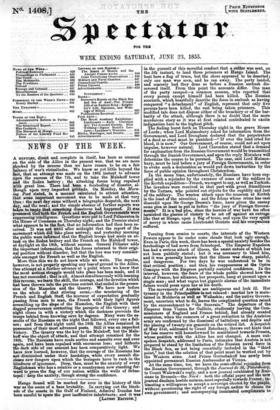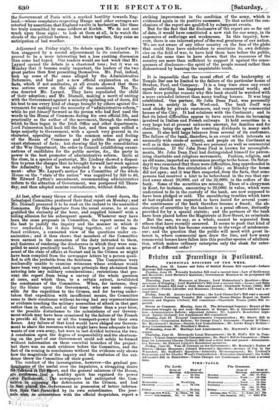Turning from armies to courts, the interests of the Western
Powers appear to lie under some clouds that look ugly enough. Even in Paris, this week, there has been a special anxiety besides the forebodings of bad news from Sebastopol. The Emperor Napoleon has had a serious attack of illness, the exact nature of which has not been publicly stated ; but it was necessary to bleed him, and it was generally known that the illness was sharp, painful, and dangerous. For two days he was understood to be in that critical position ; and then his reappearance at the Opera Comique with the Empress partially restored confidence. In the interval, however, the fears of the whole public showed how the fate of France, her alliances, her prospects, hang at present upon a single man ; and what vague but gigantic alarms of the immediate future would press upon her at his death. The movements of Austria are ambiguous and look ill. Her tyranny in the Principalities is• not relaxed : martial law is main- tained in Moldavia as well as Wallachia; and the native Govern- ment, uncertain what to do, leaves the complicated question raised by the encroachment to " the Suzerain." The departure of the Emperor from Vienna for Gallicia, studiously leaving the Com- missioners of England and France behind, had already created suspicion, when the rumours of a great reduction in the Austrian army are confirmed by the dismissal of battalions and depots and the placing of twenty-six generals on the retired list. A despatch of May 31st, addressed to Count Esterhazy, throws out hints that far less reserve will henceforward be maintained towards Prussia, whose position with the Allies has not changed. A more out- spoken despatch, addressed to Paris, intimates that Austria is not prepared to stand by the limitation of the Russian naval force in the Black Sea, as not being essentially included in the " third point," but that the solution of that point must be worked out by the Western arms. And Prince Gortschakoff has newly been appointed permanent Russian Ambassador at Vienna. At the same time, too, we have the semi-official rejoinder from the Russian Government, through the Journal de St. Petersbourg, to Count Walewski's reply, and a new journal established by Rus- sians in Brussels—the .Nord : both the official paper and the new journal disclaim hostile animus, most especially towards France ; in- timating a willingness to accept a sovereign elected by the people, without questioning the right of any foreign nation to choose its own government; and accompanying insinuated compliments to the Government of Paris with a marked hostility towards Eng- land,—whose complaints respecting Hango and other outrages are retorted by assertions that England-exults in barbarities like those too truly committed by some soldiers at Kertch. We do not rest much upon these signs : to look at them at all, is to watch the clouds of the political horizon ; but taken together, they raise an anticipation of bad weather.



































